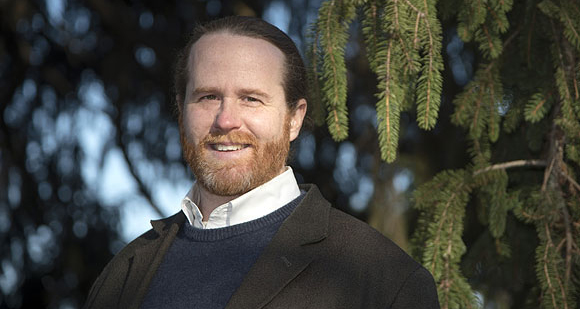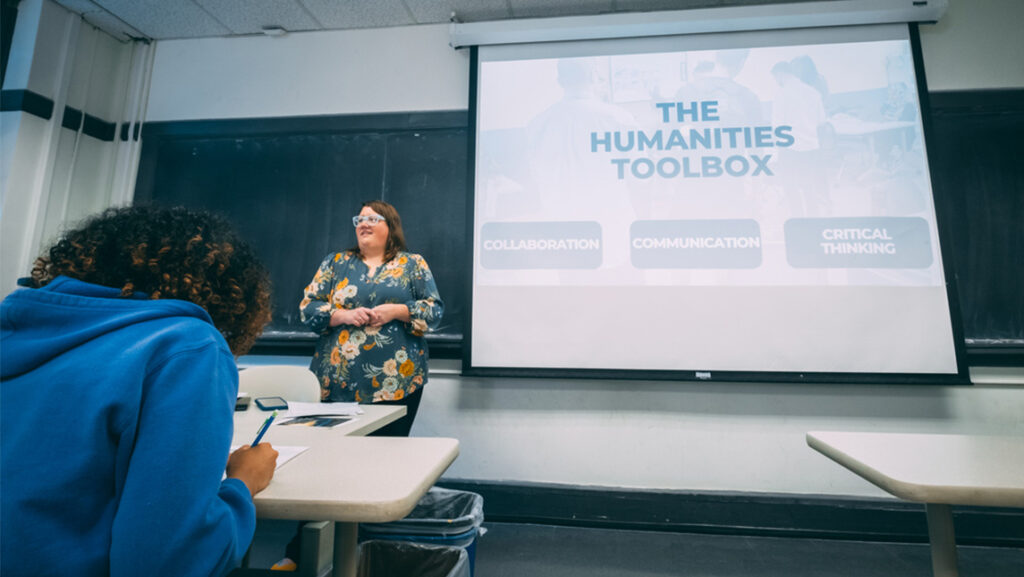UNCG’s Dr. Aaron Allen, co-editor and contributing author of the new book “Current Directions in Ecomusicology: Music, Culture, Nature,” has always had an interest in music and the environment.
As an undergraduate at Tulane University, Allen walked into his dean’s office to apply for two degree programs: music and environmental studies.
“So, let me get this straight,” the dean said. “You want to play your flute out in the swamp?”
Now known by many in the field as the “Father of Ecomusicology,” Allen looks back at that interaction and laughs.
“Even though I don’t play the flute, that was the way he interpreted the combination of those disciplines at the time,” Allen said. “When I was an undergraduate, I kept them as separate worlds. It was once I came to UNCG that I really started to explore the field that is now known as ecomusicology.”
Allen is an associate professor of musicology in UNCG’s School of Music, Theatre and Dance and director of UNCG’s Environmental & Sustainability Studies Program. He teamed up with co-editor Dr. Kevin Dawe and some of the field’s top experts to write “Current Directions in Ecomusicology,” the first comprehensive work on the subject. The book was published late last year.
Allen’s work in the field dates back to 2007, when he was part of a study group that was debating what this emerging interdisciplinary field should be called. Three years later, the editor of the Grove Dictionary of American Music asked him to write an entry on “ecomusicology,” one of the terms that had been bandied about among scholars. Allen wrote the entry, and the name stuck.
So what exactly is ecomusicology?
Simply put, it’s the intersection of music and environmental studies. The example Allen often uses is Beethoven’s Sixth Symphony.
“Beethoven composed a very famous symphony dealing with his experiences in nature,” he said. “The emotional side of the field is about how our experiences with nature can be reflected in music.”
However, Allen focuses the majority of his research on sustainability and musical instruments.
“Our musical instruments are made from natural resources. Sometimes these resources are responsibly harvested, and other times they are not,” Allen said. “We have to think about the kind of impact our cultural traditions have on the environment.”
While many people have heard about sustainability issues surrounding the harvesting of tropical hardwoods for guitars, Allen’s research on violins is less visible in mainstream media. Violin bows are often made out of a Brazilian hardwood that is endangered, and many violinists are unaware of the environmental impact they may be having.
“I often hear from violinists who have been playing for many years and have never thought about where the wood came from,” Allen said. “Most musicians know about musical instrument construction – factory or workshop – and afterward. They often don’t know about the source of the wood in that factory.”
Ecomusicology has both an intellectual appeal and practical implications. While the field facilitates creative critical thinking, it has also taken on an activist role by encouraging the music community to take action.
“Everything we do as musicians relies on nature – whether you’re a singer who needs clean air, a pianist whose instrument is made from trees or a jazz musician using a clarinet made from petroleum-based resins,” Allen said. “We think of music as a good thing that can do no harm, when, in fact, it can do some harm.”
According to University of Minnesota professor and contributing author Dr. Mark Pedelty, “Current Directions in Ecomusicology” provides a much needed framework and foundation for the field.
“Aaron and Kevin have produced a field-changing volume with CDE,” Pedelty said. “It will be the central literary focus of ecomusicology for many years.”
“Current Directions in Ecomusicology” is available at UNCG’s Jackson Library. To learn more about the book, click here.
Story by Alyssa Bedrosian, University Relations
Photography by Martin W. Kane, University Relations
Repost UNCG NOW



